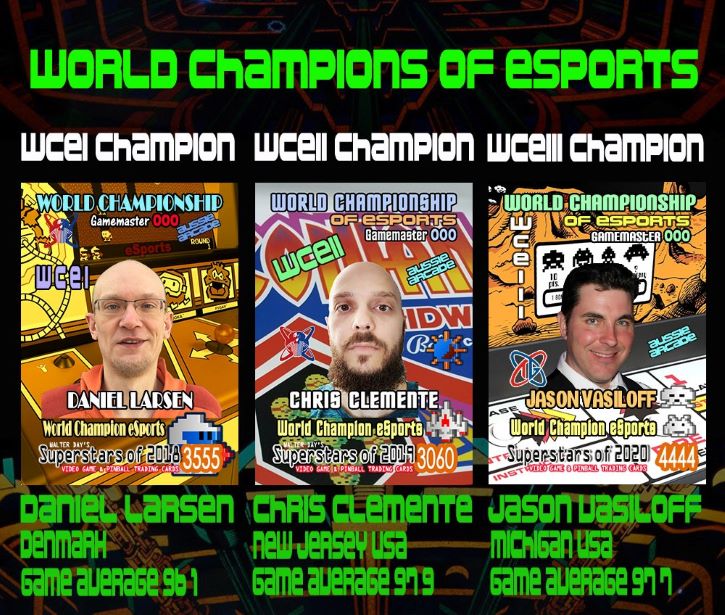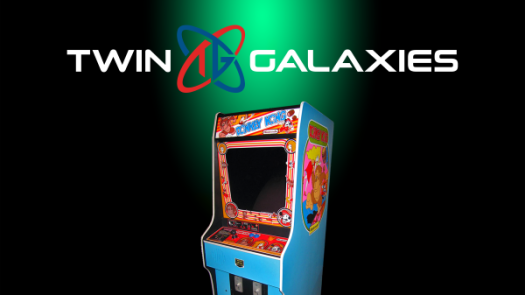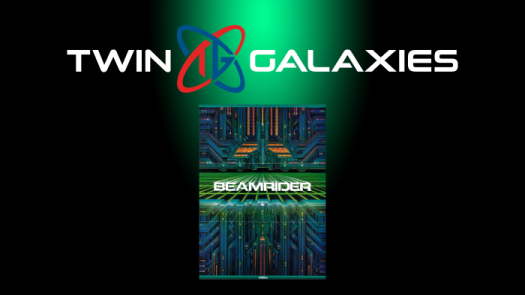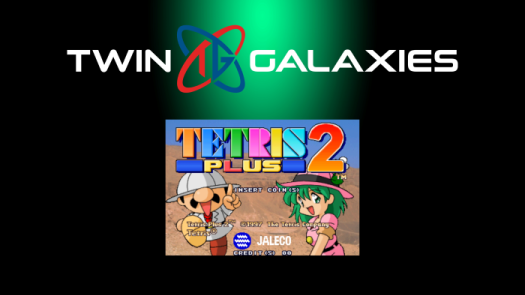It’s 8 a.m. in New South Wales and Paul Hornitzky has already settled in at his computer. While the morning ritual for other people might involve checking the news or grabbing some coffee, Paul logs onto the Aussie Arcade website to survey the latest forum messages. Over the last 24 hours, players from around the world have uploaded screenshots or photos of their personal high scores on Mappy, a 1983 arcade game release by Namco. Paul makes note of the numbers and stops to make a few posts of his own.
“You’re getting there Jeff,” he wrote, spurring on a competitor to push their score higher, “it takes a bit of time to work things out.”
It will also take a few more days to work out the final results of the first round, which will include scores from another game called Zippy Race, before Paul can update the on-line leaderboard with player rankings heading into the second round. Over the course of 59 days and 10 different arcade titles, he will tirelessly repeat the work of encouraging, tracking, updating, tabulating, and posting until a new champion is crowned.
Since 2013, Paul has been running and overseeing the Multiple Arcade Machine Emulator (M.A.M.E.) League, or MGL. The MGL traces its roots back to 2006 when the first tournament was held a few months after Travis (aka Arcade King) launched the Aussie Arcade website in 2005.
“There were only a very small number of gamers who played,” Paul recalled, “as the site was new and the membership was just commencing.”
The decision to choose MAME as the platform for arcade competition offered a multitude of advantages. In a large country like Australia where gamers were separated by great distances as well as a dwindling number of arcade locations, MAME allowed players to compete on hundreds of arcade titles from the comfort of their own home computer -- or work PC.
“You couldn’t run a competition across the whole country with physical arcade machines that people had no access to,” Paul observed matter-of-factly. “Besides, many of the games did not exist as physical arcade machines anymore.”
Despite a resurgence of interest in classic arcade games and consoles that has given rise to retro arcade bars or museums, it’s understandably a very different experience from the time when these classic titles were new releases and were found in hundreds of dedicated arcades, corner stores, and restaurants across the country.
“I was lucky to be around when the first arcade video games were released to the public,” Paul said, recounting titles like Pac-man, Frogger, Donkey Kong, BurgerTime and dozens of others. “Those times were incredibly fascinating and so different to just riding your bike or going for a swim.”
As exciting as the latest arcade game or console title might be, one couldn’t separate the game from the experience of being among like-minded gamers.
“I very much enjoyed meeting with and competing against the most different people you could possibly imagine, all at the arcade” he shared, looking back at the assortment of people - kids and adults alike - that found themselves drawn to 8-bit graphics and 3-channel sounds. “Every walk of life played video games.”
These traits would prove invaluable when, after giving the world Midnight Oil and Mad Max, Australia readied its next gift to the world twenty years later with the debut of the MGL.
Fast forward to 2011. “I was talking to a work colleague about competitive video gaming,” Paul remembered, “and that I had just discovered the existence of Twin Galaxies,” which he joined as a new member. Paul’s colleague suggested that he also join a local website called Aussie Arcade, which was hosting a classic arcade tournament. Intrigued, Paul read up on the MGL and learned that the current game up for competition was Sega’s 1982 arcade release Pengo.
“Having not played the game for over 20 years, I competed in that MGL game, kept improving my game, and high scored before the close of the [round].”
Then in 2013, an opportunity presented itself.
“The previous organizer of MGL no longer wanted to run the tournament,” Paul explained, “so I thought this would be a good opportunity to help the video gaming community and try to make this an even better tournament for all gamers to enjoy.” He threw his hat into the ring, and got the nod to run the tournament. “I was quite excited about what had just happened, and what was about to happen.”
Over the coming years, Paul built upon the legacy of his predecessors and introduced important changes to the MGL that allowed it to grow in new directions, identifying three priorities that have guided his tenure ever since: grow the competition, make the competition as engaging as possible, and foster a fun atmosphere that would be inviting for all types of gamers.
“I wanted to highlight the importance of all gamers who compete in the MGL,” Paul declared, while at the same time striving “to make sure every gamer felt important, no matter where they finished.”
Changes to the MGL included shifting to a point ranking system that awards points based on place finished with each title rather than how much higher your score was from your closest competitor, the introduction of a “mystery prize” to reward gamers who submitted scores for all of the tournament games, and a regularized format of four tournaments per year to comprise a single season, echoing the pro tennis tour and its four grand slams.
In 2014, Paul entered a new phase to extend the reach of the MGL. He embraced an advertising and promotion campaign that included posters, video trailers, and podcasts for distribution on social media channels to grow awareness and participation. The following year, he formally invited Twin Galaxies members to join and began to track the MGL season on the site in addition to Aussie Arcade. By joining audiences in the northern and southern hemispheres, Paul expanded competition on a global scale, from two countries in 2006 to 16 countries today.
“The aim and result,” offered Paul, “was that every minute of every day, somewhere, someone, is playing a game in the MGL.”
Paul’s most recent innovation was to introduce the World Championship of Esports (WCE) in 2017, which would crown a season champion based on the cumulative results of the four MGL tournaments per year. Previous WCE winners included Daniel Larsen from Denmark, Chris Clemente from New Jersey, and Jason Vasiloff from Michigan.

The impact of the MGL on competitive gaming is undeniable. The current top 3 players in the world based on Twin Galaxies MAME Expert Skill Index (ESI) standings are all former MGL champions - Andrew Barrow (5 MGL titles), Jason Vasiloff (4 MGL titles and World Champion of eSports 2019), and Robert Macauley (8 MGL titles). Other past winners in the top 10 include Max Haraske (1 MGL title) and Clay Karczewski (2 MGL titles).
“The key to running the MGL, like any great tournament,” he offered, “is to be fully committed, professional, caring and passionate about the sport and gamers you love and facilitate.”
Paul takes his commitment seriously, even when he’s supposed to be taking a break from the action with his family.
During a 16 hour flight to Los Angeles with his wife Anne earlier this year, Paul ended up watching Roland Emmerich’s 2019 war movie epic Midway.
“It started my mind flowing,” Paul reflected, “of how special the theme of the movie was compared to [Capcom arcade game] 1942, which was played in the previous MGL.”
When he learned by chance that the Second World War era battleship USS Iowa (BB61) was berthed at the Port of Los Angeles, Paul rushed off with Anne to spend the afternoon visiting the ship. “The officials had to kick me off at closing time, and I didn’t want to leave,” he said.
On his return flight, Paul found himself watching Midway a second time, “and I thought that’s it.” The theme of MGL43, which would launch the 2020 season, would be World War II in the Pacific, echoing iconic war-themed arcade games that brought vertical-scrolling shooters to the next level. “I try to be just as creative as the games designed in those golden years,”
While the MGL may not have corporate names like Riot Games or Activision Blizzard involved in the scene, it’s also clear that you can’t put a price tag on the passion that Paul brings to his position as well as his drive to foster an engaging and engrossing eSports experience. From lining up sponsors, setting up prizes, keeping track of gamers and games, providing progress updates, generating and posting leaderboard rankings, one has to wonder how he’s able to do it all.
“I see it is an honor to run the MGL,” Paul said simply. “Video gaming is an important part of my life. To communicate, compete and share the joy of video gaming is part of my DNA.”
With another season underway, MGL gamers are grateful.
For more information about participating in the MGL, visit
https://www.twingalaxies.com/ooo/wall/7942/mglxliii-arcade-firepower-world-competition







